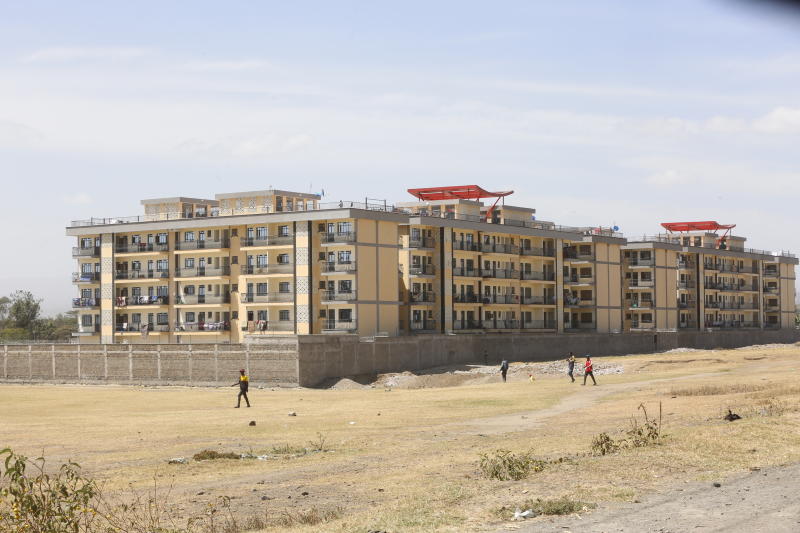
One of the apartments next to Bondeni slum in Nakuru City. [Harun Wathari, Standard]
Even before Nakuru gained city status formally last year, businesses — among them real estate companies — were already publicising their products and services with the tagline ‘city’.
Although the city status was confirmed by President Uhuru Kenyatta on December 1, some investors still hold a wait and see attitude on whether the status will have some an effect on the cost of doing business in the area.
For Kenya’s real estate sector, the market is known for its explosive reaction to such news, where land and housing prices would triple just with the revelation of a development project like road or railway in the area.
Johnson Ndege, a development consultant, says it might take a year before major changes in prices are witnessed.
“Kenya is a speculative market, so if you have idle land (in Nakuru), with all this process coming, it is likely to get investors. Demand will be high, thus the increase in prices,” he says.
He says the change in property prices would be experienced once the county comes up with a city plan and starts rezoning or reclassifying areas if there are no speculative tendencies.
According to Ndege, zoning depends on which area one will get into, noting it will result in pricing changes.
He said a town attracts more finances from development partners such as the World Bank and also through rates once conferred with city status.
“More properties are likely to get into rates. They are likely also to revise their rating role to reflect the city status and, in the process, this funding then goes into infrastructure development, rezoning and replanning,” says Ndege.
According to Ndege, the huge cash invested in infrastructure will automatically influence property prices upwards.
Replanning and rezoning also changes property use. For example, a residential property may end up being converted to offices. Some areas will also be reclassified and this, says Ndege, will raise property value.
“Now that it is a city, it will be marketed as so to the world and it will start attracting investors who will look at it as a city and not a town,” he says.
Developers with vast interests in Nairobi and its satellite towns of Machakos, Kajiado and Kiambu counties are among those eyeing investments in Kenya’s newest city.
Optiven Group chief executive George Wachiuri says the firm recently opened an office in the Rift Valley region and has a presence in Nakuru where they are targeting to invest in affordable homes.
This is despite knowing that the market in Nakuru is smaller compared to the Nairobi metropolis that has a huge population of over nine million and expansive infrastructure. Nairobi alone has about five million people.
Wachiuri says the declaration of Nakuru as a city was an indication of drastic changes in development, infrastructure, perspective and general emotional feel of the population.
“This means that land prices will drastically go up and more so in the areas near the city. The zoning will come in handy as the city gets into shape.”
He says his firm is planning to go big on affordable homes.
“The demand for land from various users both government and private sector will make the land prices rise,” says Wachiuri.
The change in price, according to Wachiuri, is expected to happen in the medium term as the government works on various regulations and city bylaws.
This, he explains, may not be a priority this year, citing the upcoming polls to be held on August 9. “So, we are looking at a good change between five to 10 years for true results to be seen on the ground,” says Wachiuri.
“City development requires good revenue to fix infrastructure.”
According to an analysis by Username Properties, another real estate firm, land prices in Nakuru appreciate at 12.7 per cent.
“This means that speculative land buyers in Nakuru enjoy 12.7 per cent per year without developing the vacant land,” says Username in an analysis released August 2021 ahead of the city status pronouncement.
The analysis cites projects such as the expansion of Nakuru-Mau Summit road, upgrading of Nakuru airstrip to international standards and the upgrading of roads within the city by the Kenya Urban-Rural Authority as some of the factors that might influence the real estate sector in the county.
Username Properties notes that there is demand for office spaces in the county. Compared to Nairobi where it costs Sh15,000 to get a licence for a small shop, opening the same in Nakuru costs Sh4,000.
“Further, the transport costs in Nairobi are higher compared to Nakuru. All these have made the demand for office spaces in Nakuru increase as businessmen and women are looking for the best location,” says the firm.
While the cost of mortgage is high across the country, the advantage that Nakuru has is that it has relatively affordable real estate prices compared to Nairobi, the firm says.
“As such, an average Kenyan can take up a mortgage or home loan and invest in a real estate product in Nakuru and pay it in a few years compared to Nairobi.”
 The Standard Group Plc is a multi-media organization with investments in media platforms spanning newspaper print
operations, television, radio broadcasting, digital and online services. The Standard Group is recognized as a
leading multi-media house in Kenya with a key influence in matters of national and international interest.
The Standard Group Plc is a multi-media organization with investments in media platforms spanning newspaper print
operations, television, radio broadcasting, digital and online services. The Standard Group is recognized as a
leading multi-media house in Kenya with a key influence in matters of national and international interest.

